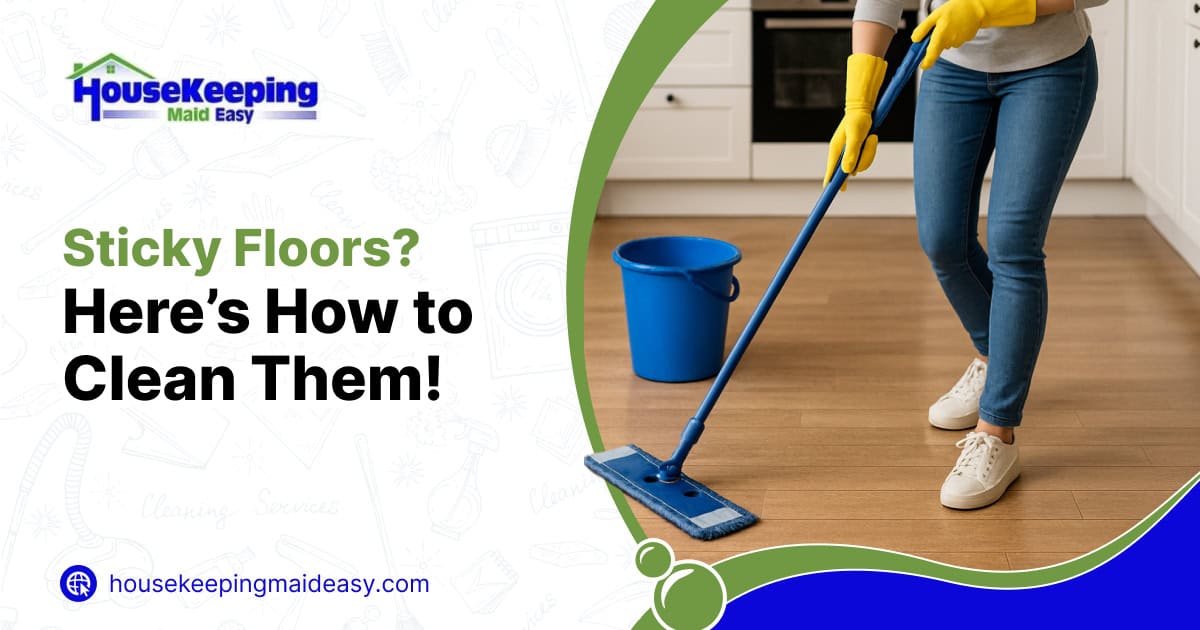
Sticky floors often happen for two primary reasons. First, too much cleaner is used. Excess soap or detergent can dry into a tacky film that clings to the floor. Second, many people skip the rinse step or use dirty mop water, which spreads residue instead of removing it.
If the floors of you Indianapolis home never feel clean no matter how often you mop, it may be time for a professional deep cleaning to break down built-up product and grime.
The simplest solution is often the most effective. Mop the floor with warm water to loosen soap residue. Then rinse again with a fresh bucket of clean water. This double rinse removes leftover product without adding anything harsh.
Plain water is safe for hardwood, tile, laminate, vinyl, and most sealed surfaces. If sticky patches remain, try slightly hotter water or a light scrub to break up stubborn film.
If warm water isn’t enough, switch to a cleaner designed specifically for your flooring type. Always follow label instructions and avoid overusing product. A little goes a long way.
Using the wrong cleaner—such as an oily wood polish on laminate—can leave a long-lasting residue. After mopping with cleaner, always finish with a clean-water rinse. For ongoing upkeep, many Indianapolis homeowners choose recurring cleaning services to keep floors consistently fresh and buildup-free.
White vinegar naturally cuts through sticky residue. Mix one cup of vinegar with one gallon of water, mop your floors, and let the acidity dissolve the film.
This method is best for tile, vinyl, and linoleum. Do not use vinegar on unsealed wood or natural stone, as the acid may dull or damage the surface.
Ammonia is effective for stubborn buildup, but should be used with caution. Mix half a cup of ammonia with a gallon of water, wear gloves, and mop the floor. Ammonia breaks down sticky residue quickly.
Only use ammonia on durable, sealed surfaces like porcelain or ceramic tile. Never use ammonia on wood, laminate, or vinyl flooring—it can strip protective coatings.
Sticky floor issues are preventable with a few smart cleaning habits. Use the right cleaner in the right amount. Always rinse after mopping to remove leftover soap. Clean spills promptly and change mop water frequently so you aren’t spreading dirt around.
If sticky floors keep returning, you may benefit from a one-time deep clean or ongoing help from professionals. Regular maintenance prevents buildup and keeps floors smooth and comfortable.
Sometimes sticky floors indicate deeper problems, including wax buildup, layers of old product, or grime trapped in floor texture that a standard mop can’t remove. In these cases, hiring a professional cleaning service is the quickest and safest solution.
Housekeeping Maid Easy has been cleaning Indianapolis homes for more than 18 years. From routine tidying to full move-in and move-out cleaning, our trained and background-checked team knows how to safely clean every flooring type. We remove residue, restore shine, and ensure your floors stay cleaner for longer.
If sticky floors are driving you crazy, let the experts handle it. Housekeeping Maid Easy serves homeowners throughout Indianapolis, Carmel, Fishers, Westfield, Noblesville, and Zionsville with reliable, effective cleaning services backed by a 100% satisfaction guarantee.
Schedule your cleaning today and enjoy smooth, spotless floors without the stress.